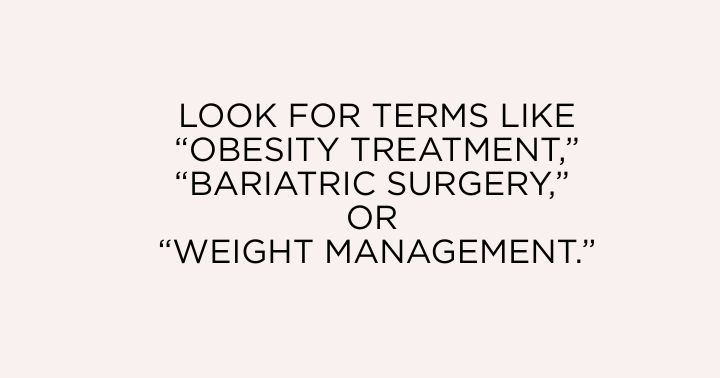
Obesity isn’t a cosmetic issue. Remember that being obese can have a huge impact on your health. It can lead to diabetes, heart disease, high blood pressure, and other chronic illnesses. Because of its impact on your health, you may wonder, “Is obesity covered by insurance?”
The answer depends on your health insurance plan, as well as the treatment that you need and whether or not your provider considers obesity treatment medically necessary.
Obesity as a Medical Condition
The American Medical Association (AMA) officially recognized obesity as a chronic disease in 2013. It was a major milestone because it encouraged insurance companies to view obesity as a medical condition. It’s no longer a lifestyle issue.
As a result, it made it possible for many treatments related to weight management, bariatric surgery, and obesity counseling to qualify for insurance coverage. Unfortunately, coverage isn’t always automatic. Insurance providers set certain criteria for medical necessity. In that case, you need to meet them before your claim will be approved.
What Types of Obesity Treatments Insurance May Cover
Insurance coverage for obesity falls into several categories. It always depends on your plan and the severity of your condition.
1. Bariatric Surgery

For your claim to be approved, you must meet these criteria:
- A BMI of over 40 or higher
- A BMI of 35 or higher with type 2 diabetes, hypertension, sleep apnea, and other obesity related conditions.
- Documented attempts at non-surgical weight loss programs
Once you meet these requirements, your provider may cover pre-operative tests, the surgery, and post-operative care.
2. Medical Weight Management Programs
Some insurers provide coverage for structured weight loss programs. But they must be supervised by a doctor or a registered dietitian. These programs may include:
- Nutritional counseling
- Prescription weight loss medications
- Behavioral therapy
- Regular monitoring and follow-up visits
Coverage for these programs varies widely. Some plans may cover several visits per year. Others, however, may only provide partial disbursement.
3. Prescription Medication for Weight Loss
With the approval of newer FDA-approved weight loss drugs, many insurance companies have started to include prescription coverage. Medications like semaglutide or phentermine may be covered if deemed medically necessary.
However, not all plans include obesity drugs. Thus, you must check your formulary list or speak directly with your insurer.
4. Nutritional Counseling and Preventive Care
Many insurance plans must cover preventive services without cost-sharing, under the Affordable Care Act (ACA). The benefits may include:
- Initial obesity assessments
- Nutrition education
- Counseling to promote healthy lifestyle changes
- The coverage is useful if you are overweight or obese but not yet facing severe complications.
What Affects Approval
It’s true that obesity is a chronic illness. However, insurance coverage isn’t guaranteed. Several factors can affect whether your treatment is covered:
- If you have employer-sponsored plans, remember that each one has a set of coverage rules.
- Some states mandate coverage for certain obesity treatments.
- Insurers often require proof that your treatment is medically necessary.
- You may need to provide records of previous weight loss attempts, lab results, and doctors’ notes.
For instance, if you wish to undergo bariatric surgery coverage, you may need to complete a 6-month supervised weight loss program before approval.
How to Check If Your Insurance Covers Obesity Treatment

If you want to undergo weight loss surgery or any medical obesity treatment, it’s vital that you verify coverage before starting. The first thing you’re going to do is review your policy documents. Look for terms like “obesity treatment,” “bariatric surgery,” or “weight management.”
Or you may call your insurance provider. Make sure to ask what treatments are covered, what your copays are, and what prior authorization is required.
You should also check your state’s mandate. Keep in mind that some states require coverage for obesity treatments. This is especially true for Medicaid recipients.
Most importantly, you need to get documentation from your doctor. This can strengthen your case. You should also ask about pre-authorization. Many providers do require prior approval for surgeries.
Out-of-Pocket Costs
It’s important to note that even if you have insurance, you may still have to pay for out-of-pocket expenses for certain treatments. These can include deductibles and copayments, costs for out-of-network providers, and non-covered medications or procedures.
If you don’t qualify for insurance coverage, you have other options, like health savings accounts, flexible spending accounts, financing programs, or clinical trials that provide free or reduced-cost treatment.
Tips for Getting the Treatment Covered
First, you need to work closely with your doctor. Make sure that your physician documents your condition thoroughly. It can make a huge difference.
It’s also vital that you submit prior authorizations early. Doing so will help prevent claim denials.
On the other hand, if your claim is denied, you can appeal and submit additional medical evidence. It’s your right. But it’s also important to remember to stay informed. Remember that insurance coverage rules can easily change annually.
Frequently Asked Questions (FAQs)
Does insurance cover weight loss surgery?
Yes, most major insurance plans cover bariatric surgery if it meets medical necessity criteria, such as a BMI of 40+ or 35+ with related health conditions.
Are obesity medications covered by insurance?
Some FDA-approved weight loss drugs are covered. However, coverage varies by plan. Thus, check your formulary and speak with your insurer.
Is nutritional counseling for obesity free?
Under the ACA, preventive services like obesity screening and counseling are often covered without cost-sharing for eligible individuals.
Does Medicare cover obesity treatment?
Yes, Medicare covers obesity screening, behavioral therapy, and certain bariatric surgeries for eligible patients.
What if my insurance denies coverage?
You can file an appeal with additional documentation from your healthcare provider to support your claim.
Speak Now ... Or Forever Hold Your Peace